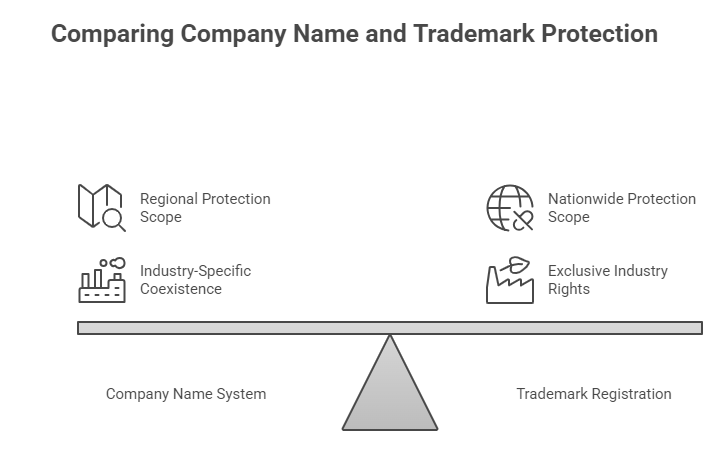When expanding into China’s market, protecting your company name is as crucial as safeguarding your physical assets. Many foreign businesses discover—often too late—that their established brand names have been registered by local entities, leading to costly legal battles and market confusion. This guide explains the administrative and judicial remedies available to protect your rights in Chinese company name disputes.

Understanding China’s Company Name System
China operates a first-to-file system for company name registration, governed by the Company Law and Enterprise Name Registration Administration Regulations. Unlike trademark registration which offers nationwide protection, company names are registered at local administration levels, creating potential conflicts.
Key characteristics:
- Regional protection: Names are protected only within the registered jurisdiction
- Industry-specific: Identical names can coexist across different industries
- Strict naming rules: Prohibits misleading, offensive, or government-related terms
Administrative Complaint Process
Foreign companies can file complaints through China’s Market Supervision Administration (MSA) when encountering:
- Identical or confusingly similar names causing public confusion
- Bad-faith registrations where the registrant knew of your prior rights
- Violations of naming rules (e.g., using “China” without authorization)
Step-by-Step Administrative Procedure
- Evidence Collection
- Notarized proof of your brand’s prior use (sales records, ads, trademark certificates)
- Documentation showing the disputed company’s registration details
- Evidence of actual confusion (customer complaints, mistaken transactions)
- Filing the Complaint
- Submit to the MSA where the infringing company is registered
- Required documents:
- Complaint letter (Chinese version)
- Business license copy
- Authorization letter for your representative
- Evidence materials with Chinese translation
- Administrative Review
- Typical processing time: 3-6 months
- Possible outcomes:
- Order to change the infringing name
- Revocation of the registration
- Fines up to ¥50,000 for violations
Case Example: A German machinery manufacturer successfully petitioned the Shanghai MSA to revoke a local competitor’s registration of their identical English trade name, despite the Chinese company having registered it first locally.
Civil Litigation Pathway
When administrative remedies prove insufficient, foreign companies can pursue civil action under:
- Anti-Unfair Competition Law (Article 6)
- Tort Liability Law
- Trademark Law (if the name is registered as a trademark)
Critical Evidence Preparation
- Prior Rights Documentation
- Trademark registration certificates (China or international)
- Notarized evidence of brand use before the disputed registration
- International fame evidence (awards, media coverage)
- Confusion Proof
- Consumer survey reports (conducted by licensed agencies)
- Expert opinions on similarity assessment
- Actual confusion instances (misdirected communications, mistaken contracts)
- Damages Calculation
- Your company’s China revenue records
- The infringer’s profit statements (obtained through court order)
- Reasonable licensing fees for comparable brands
Pro Tip: China courts increasingly recognize well-known foreign brands’ rights. In 2022, a U.S. fashion brand won ¥3.2 million in damages despite the infringer having registered the company name first in a tier-3 city.
Preventive Measures
- Trademark Registration First
- File Chinese trademarks before market entry (including Chinese characters)
- Consider comprehensive IP protection strategies covering all brand elements
- Monitor Registrations
- Regular checks in key jurisdictions through official business registry searches
- Watch services for similar name applications
- Early Administrative Opposition
- File objections during the 3-month publicity period for new registrations
When Disputes Arise: Action Plan
- Cease-and-Desist Letter
- Drafted by Chinese legal counsel
- Sets timeline for voluntary name change
- Parallel Proceedings
- Combine administrative complaint with civil action
- Seek preliminary injunctions where available
- Negotiation Leverage
- Use dispute resolution to negotiate broader cooperation
- Many cases settle with licensing agreements
For complex cases involving executive malfeasance, consider UBO background checks to uncover bad-faith actors.
Conclusion
China’s legal system provides meaningful recourse for foreign companies facing name disputes, but success requires understanding the dual administrative-judicial framework and preparing evidence to Chinese legal standards. Proactive registration combined with vigilant monitoring forms the best defense against name squatting and unfair competition in this critical market.
